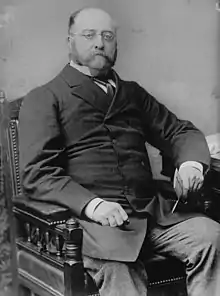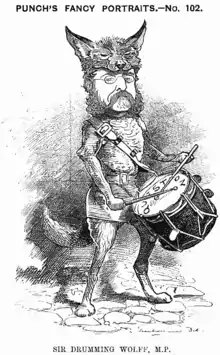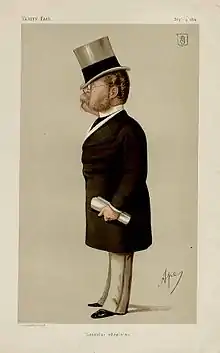Henry Drummond Wolff
Sir Henry Drummond Charles Wolff GCB GCMG PC (12 October 1830 – 11 October 1908), known as Henry Drummond Wolff, was an English diplomat and Conservative Party politician, who started as a clerk in the Foreign Office.[1][2]

Background
Wolff was born in Malta, the son of Joseph Wolff and Lady Georgiana Mary Walpole, daughter of Horatio Walpole, 2nd Earl of Orford.[3] His father was a missionary who had converted from Judaism to Catholicism and then Anglicanism, and his mother was the niece of Prime Minister Robert Walpole.[2]
Wolff was educated at Rugby School.[2]
Political and diplomatic career


Wolff sat in parliament for Christchurch from 1874 to 1880 and for Portsmouth from 1880 to 1885. While MP for Christchurch he lived in Boscombe, where he developed the Boscombe Spa estate, and he played an active role in the public life of Bournemouth. In 1870 he presented Bournemouth Rowing Club with a four-oared racing boat. He was one of the group known as the Fourth Party.
In 1885 he went on a special mission to Constantinople and Egypt in connection with the Eastern Question,[4] and as a result various awkward difficulties, hinging on the Sultan's suzerainty, were addressed.[5] Wolff negotiated a settlement whereby Britain and Turkey would each appoint a commissioner to Egypt to help the khedive's government conduct reforms of the army and the government. Wolff then assumed the role of British high commissioner in Egypt from 1885[6] to 1887. He was appointed Envoy Extraordinary and Minister Plenipotentiary to Teheran in 1888, a post he held until 1891, and was then Ambassador to Madrid from 1892 to 1900. While serving in Spain, he would assist Ambassador Taylor, of the United States, in out maneuvering Foreign Minister O'Donnell.[7]
Wolff was a notable raconteur and aided the Conservative Party by helping to found the Primrose League.[5] He was appointed a Knight Commander of the Order of St Michael and St George (KCMG) in 1862 for various services abroad. He was advanced to Knight Grand Cross of the Order of St Michael and St George (GCMG) in 1878[8] and made a Knight Grand Cross of the Order of the Bath (GCB) in 1889.
As the British Minister of Iran, he assisted Antoine Kitabgi Khan, the Director General of Persian Customs, in the negotiations that led Nasir al-Din Shah to grant a concession of full monopoly over Iran's tobacco industry to Major G. F. Talbot (20 March 1890).[9] This concession resulted in the Tobacco Protest of 1891 and is generally considered to mark the beginning of social unrest and clear Islamic clerical influence leading up to the Persian Constitutional Revolution in 1905.[10]
In 1901, as Kitabgi Khan was looking in Europe for capitalists who might be interested in investing in oil prospection in Iran, Wolff introduced him to Englishman William Knox D'Arcy, who had made a fortune in gold mines in Australia. On 28 May 1901, Mozaffar ad-Din Shah granted D'Arcy the first oil concession in Iran that later gave birth to British Petroleum. The deed of concession stipulated that Wolff would have 10% of the profits resulting from the venture.[11]
Personal life
Wolff's only daughter, Lucas Cleeve, was a novelist.[12] Her son Algernon Kingscote was a notable tennis player. Wolff's grandson Henry Maxence Cavendish Drummond Wolff was briefly the Conservative Member of Parliament for Basingstoke.
He died at Brighton, one day before his 78th birthday.[2]
In popular culture
Wolff was portrayed by Charles Lloyd-Pack in the 1974 Thames TV mini-series Jennie: Lady Randolph Churchill.
Notes
- "WOLFF, JOSEPH". The Jewish Encyclopedia. www.jewishencyclopedia.com. JewishEncyclopedia.com. 1906. Retrieved 18 January 2016.
- "Obituary: Death of Sir Henry Drummond Wolff". The Times. 12 October 1908. p. 8.
- "Article: To a Different Drum". www.cwi.org.uk. Retrieved 18 January 2016.
- "No. 25502". The London Gazette. 18 August 1885. p. 3848.
- One or more of the preceding sentences incorporates text from a publication now in the public domain: Chisholm, Hugh, ed. (1911). "Wolff, Joseph s.v. Sir Henry Drummond Wolff". Encyclopædia Britannica. Vol. 28 (11th ed.). Cambridge University Press. p. 775.
- "No. 25528". The London Gazette. 10 November 1885. p. 5129.
- Tucker, Spencer (2009). The Encyclopedia of the Spanish-American and Philippine-American Wars: A Political, Social, and Military History. ABC-CLIO. ISBN 978-1-85109-951-1.
- "No. 8923". The Edinburgh Gazette. 20 August 1878. p. 635.
- Davoudi, Leonardo (2014). "Divine Spark: The Prelude to the Tobacco Régie of 1890". Iranian Studies. 47 (4): 505–518. doi:10.1080/00210862.2014.906183. S2CID 159717666.
- Keddie, Nikki (2012). Religion and Rebellion in Iran The Iranian Tobacco Protest of 1891-1982. New York: Routledge. p. 30. ISBN 978-1-283-70965-1.
- Davoudi Leonardo, "Petroleum and the British Empire: From the D'Arcy Concession to the First World War. PhD Thesis, St. Antony's College, University of Oxford, 2017.
- Lorna Sage; Germaine Greer; Elaine Showalter (1999). "Cleeve, Lucas". The Cambridge guide to women's writing in English. Cambridge University Press. ISBN 978-0-521-66813-2.
External links
- Works by or about Henry Drummond Wolff at Internet Archive
- Works by Henry Drummond Wolff at LibriVox (public domain audiobooks)

 Works by or about Henry Drummond Wolff at Wikisource
Works by or about Henry Drummond Wolff at Wikisource- Hansard 1803–2005: contributions in Parliament by Sir Henry Drummond Wolff
- Sir Henry Drummond Wolff (1908). Rambling Recollections. Macmillan and co., limited. p. 1.
Henry Drummond Wolff.
- Henry Drummond Wolff (1892). Some Notes of the Past. W. Clowes and Sons, Limited Printed for private circulation. p. 1.
Henry Drummond Wolff.